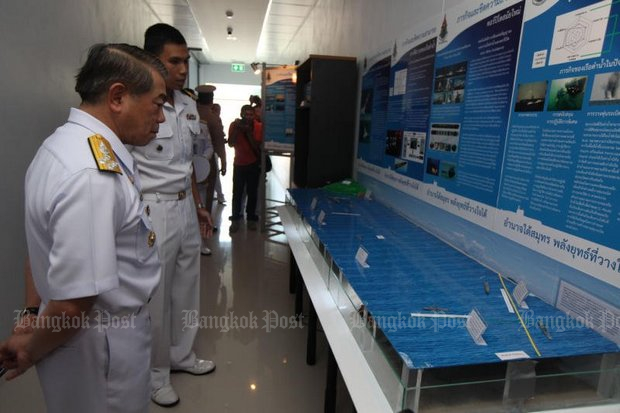
The decision of the military regime to approve the procurement of a 13.5-billion-baht submarine from China in what has been seen as a cover-up comes at a high price: public trust.
How can we now have trust in its planned massive spending on controversial military supplies?
Defence Ministry spokesman Maj Gen Kongcheep Tantravanich surprised local journalists on Monday when he admitted that the cabinet, chaired by Prime Minister Prayut Chan-o-cha, approved the proposed procurement of a Yuan-class submarine from China worth 13.5 billion baht a week ago.
The approval was covered up for a week until Deputy Prime Minister and Defence Minister Gen Prawit Wongsuwon dropped a hint at the Defence Council meeting on Monday that military hardware and equipment to protect the country's maritime interests were necessary and the purchase of such equipment would be made with transparency.

Soonruth Bunyamanee is deputy editor, Bangkok Post..
His remark prompted military reporters, who had been led to believe that cabinet consideration of the sub purchase would have taken place Tuesday, to dig into the issue until the authorities including government spokesman Lt Gen Sansern Kaewkamnerd finally admitted that the planned purchase had been endorsed on April 18.
The "secret" cabinet approval of this controversial deal has changed the focus of criticism from the appropriateness of the submarine purchase to the transparency of the procurement.
Gen Prawit said the issue was confidential for the sake of security while Maj Gen Kongcheep said not all of the issues approved by the cabinet have to be released to the press. To a certain extent, they are correct. But the excuse cannot be applied to such a contentious issue with strong public concerns over how taxpayers' money should be used.
Before this, several elected governments decided to shelve the purchase for fear of criticism.
This time, the navy claimed the planned purchase, with a total cost of 36 billion baht for three Chinese submarines, will be financed by its owned budget over the next 11 years. While this is true, I'm sorry to say that navy budgets come from taxpayers as well.
The approved purchase seems not to conform with the stance of the government regarding national reform which has seen the regime reiterate the necessity of anti-corruption and transparency in state projects.
Buying weapons and military supplies from defence contractors around the world has met with heavy public scepticism over transparency and vulnerability to corruption for decades. Best practice in terms of transparency and accountability of military budget spending on weapons purchases is always in question.
Military leaders have repeatedly cited national security and confidentiality for their arms procurements. If the armed forces were strict on transparency and accountability in their weapons procurements, there would not be problematic cases like the 350-million-baht broken army airship and US$241 million (8.3 billion baht) contract for several dozen T-84 Oplot tanks with Ukraine which have not been fulfilled.
Credit Suisse's military strength index in 2015 ranked Thailand 16th, top in Asean, for the world's strongest militaries in term of budget spending and military supplies. Imagine how bad it would be if military procurement lacks transparency.
 A navy committee of up to 30 officers dealt with the procurement process fairly and thoroughly, according to the deputy premier.
A navy committee of up to 30 officers dealt with the procurement process fairly and thoroughly, according to the deputy premier.For the submarine deal, in fact, I believe many people can be convinced of its benefits.
I agree the country should maintain a full military capability and balance military strength in the region to ensure the free movement of vessels in and out of Thai waters under all circumstances. This is a matter of sovereignty and territorial integrity.
Buying submarines, for me, is acceptable if it enables the country to fulfil such goals.
Some people question why the country needs submarines when there is no prospect of war looming. I liken this question to why we go to the gym to keep our bodies fit. Is it because we will have to fight with others? The answer is definitely no.
In the near future, when the Dawei deep-sea port opens in Myanmar, shipping lanes around the western coast are expected to be bustling, which will need increased maritime security and protection of the country's maritime interests.
We should not ignore the fact that several Asean neighbours that have connecting marine territories with ours have commissioned several fleets of submarines. Although there is no conflict now, who knows what will happen in the future due to growing economic interests.
Some have said such a massive budget earmarked to buy submarines should be used for projects with real public benefits instead. I fully agree but in reality, such a premise is unlikely. If the navy opts not to buy submarines, it will spend the money to buy other military supplies for sure.
There is also sarcasm from some quarters that the submarines are a dream come true not just for navy personnel but also Thai kids as they will have new exciting equipment to ride on Children's Day apart from tanks and fighter jets.
Seriously, I don't think it's a matter for sarcasm. Having submarines can inspire kids in terms of patriotism and technological development as well as future careers.
While the pros and cons of buying subs are debatable, the thing that cannot be compromised on is the transparency of the procurement process.
These days, local news headlines are dominated by numerous high-profile scam cases. Among them, several medical doctors were fooled by their trusted colleagues to invest in a fake tourism service scheme and academics and members of a university savings co-operative were lured by a trusted senior academic and then co-operative manager to invest in a fake lottery scheme.
What we can learn from these cases is that we can be defrauded even by the people we trust.
With the government apparently trying to keep the submarine procurement out of public discourse from the start, how can the public trust the procedure? How can taxpayers trust the navy's explanations and the information it uses to justify the necessity of the massive spending.
And how can we trust the regime with its national strategic plan for the next two decades, particularly when the law facilitating the plan has empowered all military top brass to sit on a committee to draft and review the plan over its 20-year time frame.
